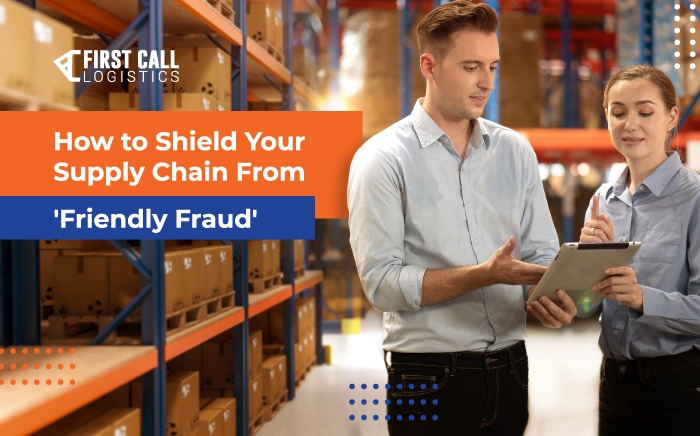Keep Your Supply Chain Safe from “Friendly Fraud”

It’s an unfortunate truth that most every supply chain is susceptible to fraud attempts, as everything from seemingly innocent false invoices to entirely fake carrier services exist purely to catch one piece of your company’s logistics process slightly out of place. A small miscommunication or failure to follow established procedures can lead to major ramifications down the line — only, it’s not always a sinister spammer who’s at fault.
In fact, some estimate the majority of fraud instances can be chalked up to well-meaning customers who just need a short phone call to sort them out.
What Is Friendly Fraud?
Friendly fraud is, by definition, accidental. It’s most frequently associated with a cardholder who unwittingly disputes a legitimate purchase, either because they forgot they authorized the charge or because someone else authorized it but didn’t communicate clearly with the cardholder. On occasion, friendly fraud can also arise when a customer genuinely misunderstands aspects of a contract.
It’s important to distinguish between friendly fraud and true fraud in its many forms, including schemes to receive refunds for a product while still obtaining the product or service rendered. Friendly fraud is so-named because it isn’t done with malicious intent by someone trying to harm you and your business. Unfortunately, the impact remains the same despite their good intentions.
Research estimates friendly fraud will represent more than 60% of all chargebacks in 2023. For the businesses producing goods and rendering services this can be a particularly frustrating hurdle, as it is difficult to forecast and can weaken relationships with even the best shipping partners.
Then of course there are overhead costs to consider — particularly time and effort. Logistics is a business of getting every moving piece of the supply chain puzzle to align; when small miscommunications result in friendly fraud, all that effort to harmonize a difficult delivery leads to significant financial consequences.
Common Examples of Friendly Fraud
There are different types of friendly fraud, and in today’s world they almost all impact the logistics industry in one way or another. These include:
- Unauthorized item claims. Customers might claim they didn’t receive the correct items, or maybe received unordered items, increasing overhead costs of shipping and transportation. “Family fraud,” or purchases unauthorized by the actual cardholder, fall into this category.
- Friendly chargebacks. Customers dispute legitimate transactions, but just want the money back without having to return goods — or perhaps want to return goods without paying for return shipping costs.
- Package interception. Fraudulent redirection of packages or claiming non-delivery when they have in fact received the package.
- False claims of damaged goods. Customers might exaggerate or falsely report damages to obtain refunds or replacements without being charged shipping for the return.
- Subscription abuse. Customers intentionally misuse free trials or subscription services, and then later dispute the charges by asking for a refund.
Shielding Your Business from Friendly Fraud
Friendly fraud can escalate quickly into full-blown scamming if you’re caught unprepared or are regularly taking on new business with unfamiliar partners — there’s nothing wrong with expanding your company’s customer base, but be sure to check into the following as you do so:
- Implement robust transaction certification procedures. Make sure every purchase or transaction takes a few steps. Your consumers would have to agree and approve every purchase a few times, as well as understanding the refund policy.
- Improve customer communication and dispute resolution channels. Change your customer service up just a little bit to make sure your consumers know exactly what your policies are regarding cancellations, returns, and chargebacks.
- Strengthen return and refund policies. Include strict policies regarding returns and refunds, like paying for return shipping, the window of time returns can be made, and how refunds will be handled.
- Utilize advanced fraud detection tools and techniques. Identify fraudulent transactions as soon as they occur. The right tools can help you with fraud scoring, IP address geolocation, and device fingerprinting.
- Partner with a 3PL to help handle returns. Make sure your logistics partners are equipped to handle returns in a smooth, efficient manner. A good 3PL will help you navigate this area of logistics.
Putting standard practices into place to prevent friendly fraud before it occurs will likely save you some tough conversations — and will definitely keep you from losing money on otherwise successful deliveries.
Learn more about how a third-party logistics partner like First Call Logistics can help smooth over your returns processes by contacting us today; we look forward to partnering with you!
Simplify your Next Shipment with First Call Logistics
Building and managing cost-efficient supply chains is a full-time job. First Call’s rare combination of in-house assets, expert problem-solving and track record of stellar customer service makes us the 3PL of choice for business partners with a wide range of shipping needs.
More Logistics Resources:
Get the latest supply chain news and updates directly to your inbox.
